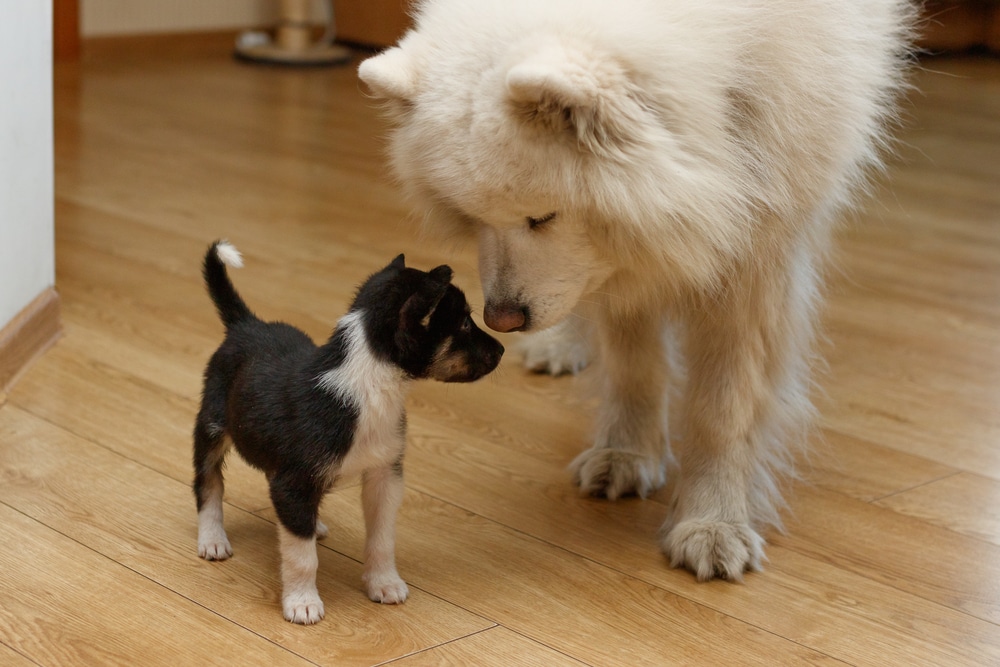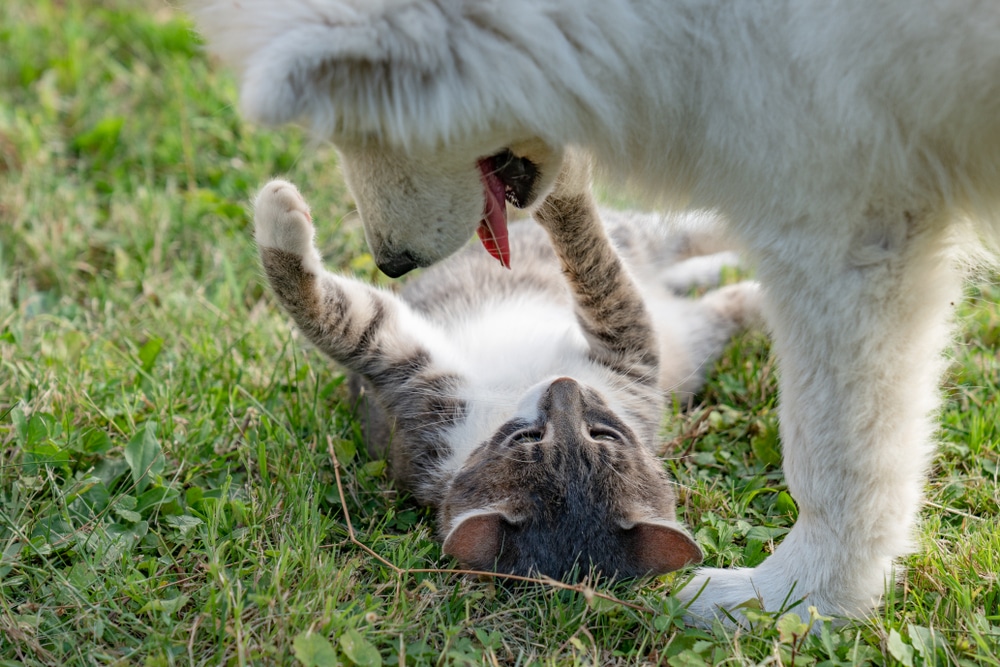Introducing Samoyeds to other pets is a great way to add love and companionship to your home. Samoyeds are known for being loyal, affectionate, and friendly, but when it comes to living with other pets, there can be some challenges and concerns. So, before bringing a new pet into your home, it is important to do your research to know if Samoyeds get along with other pets or not.
Samoyeds are typically friendly toward other pets such as cats, dogs, and small mammals. However, they can be quite territorial and may not accept the presence of other animals unless they are properly socialized. Positive reinforcement is key for successful training. With patience and careful introduction, your Samoyeds can live harmoniously with other pets.
Table of Contents
Are Samoyeds Friendly With Other Pets?

It is well known that Samoyeds are typically friendly with dogs. But when it comes to other pets the next question that comes to mind is, “Do Samoyeds get along with other pets in the home?” Let’s explore the answer.
Cats
Samoyeds can be friendly with other animals in the home, such as cats. However, due to their natural herding and hunting instinct, it is important to introduce a Samoyed and a cat properly if you are planning on having both in the same household.
For the best results, it would be beneficial to get both animals at a young age and gradually introduce them. With patience and guidance, Samoyeds can be trained to coexist peacefully with cats in the same home.
Birds
Samoyeds can have good relationships with other pets such as cats and birds, given proper socialization and training. Introducing a Samoyed to a bird should be done carefully and deliberately and with supervision until the two are comfortable.
Dogs
Samoyeds typically get along well with other dogs, provided they are properly socialized from a young age. Samoyeds that have grown up around other pets may be more comfortable in their presence and will be less likely to show any aggression. In general, Samoyeds are very friendly and welcoming toward other four-legged friends.
Other Small Animals
Samoyeds are typically very friendly with other small animals such as cats and rodents, although they may try to herd them. However, if the smaller animal is not used to being around dogs, it may be best to supervise interactions between them. It is also important to remember that Samoyeds were bred as herding dogs, so there is a chance they may try to herd other animals.
Do Samoyeds Do Better In Pairs?
Samoyeds do best when they have a canine companion. They form strong bonds with humans and other dogs, so having two pups can help prevent boredom and loneliness. Bringing home a new puppy is made easier when there is an older sibling to teach them the ropes.
Additionally, two Samoyeds can provide companionship for each other and help reduce separation anxiety in both dogs. If you’re thinking of getting a Samoyed, consider getting two so that they can each have a lifelong friend and be their happiest selves.
How To Introduce A New Pet Into the Home With A Samoyed?
Introducing a new pet into an existing Samoyed home can be difficult. Following these steps can help ensure harmony in the home.
Vaccinate All Animals
Make sure your Samoyed is up to date with their vaccinations. They mustn’t spread any diseases to the new pet, so make sure all of their shots are up to date.
Take It Slow
Take your time introducing the two animals to each other. Start slowly by keeping them on opposite ends of the room and gradually bringing them closer together.
Reward And Praise
Provide positive reinforcement to both pets when they interact correctly with each other. Give them treats or petting to encourage good behavior.
Supervise Them
Supervise your pets during their interactions, and make sure neither is overly aggressive towards the other. Separate them if necessary.
Give Them Space
Give each pet its own space and toys to avoid competition over resources.
Develop Routines
Create a schedule for feeding, exercise, and playtime to ensure both of your pets get the attention they need.
What To Do If Your Samoyed Doesn’t Get Along With Other Pets?
A Samoyed is a social creature that requires companionship, but if they are not showing friendly behavior towards other animals, steps can be taken to control the situation. Let’s start with remaining calm.
Remain Calm
As with any pet behavior issue, it is important to remain calm when addressing aggression between pets. This will help ensure the situation does not escalate and that you can focus on a resolution.
Identify The Cause Of Aggression
To resolve conflicts between pets, it is important to identify the underlying cause of the aggression. In some cases, it may be due to a lack of socialization or unfamiliarity with other animals.
Establish Boundaries And Rules
Once you have identified the root cause of any aggression between pets, it is important to establish boundaries and rules to prevent any further issues from occurring. Ensure all pets are clear on who the leader is and what behavior is expected of them.
Create Positive Experiences
It is important to create positive experiences for your pets when introducing a new pet or when they come into contact with other animals. This can be done by providing treats, engaging in play, and offering lots of praise when pets positively interact with each other.
Refrain From Punishing Your Samoyed
Punishing a Samoyed for aggressive behavior is not recommended, as it can cause further issues. Instead, focus on providing positive reinforcement and reward-based training to discourage negative behaviors.
Seek Professional Help
It is important to seek professional help if aggression between your pets does not improve after you have taken the steps outlined above. A qualified behaviorist or trainer can provide additional guidance on how to resolve any underlying issues that may be contributing to the conflict.
Tips For Keeping Your Samoyed And Other Pets Happy Together
By following these tips, you can keep all your pets happy and help them get along in your home. With patience and understanding, cats, dogs, and other animals can coexist peacefully.
Have Rules
Establishing and enforcing clear rules will make sure everyone in the household–both two-legged and four-legged–knows what is expected of them, reducing potential conflict between pets.
Spend Equal Time With All Pets
Ensuring each pet gets equal amounts of one-on-one time from their owners will help them bond with their humans and feel loved, as well as reduce the risk of fighting.
Provide All Pets With Proper Exercise And Enrichment
Samoyeds are very active dogs, so make sure they have plenty of safe and exciting toys to play with when they’re not getting enough exercise. For cats and other small pets, provide a variety of enrichment activities to keep them occupied.
Give Them Their Own Space In Your Home
Allowing pets their areas in the home, such as a bed or cat tree, will help them feel secure and give them a safe place to retreat when they need some alone time.
Use Positive Reinforcement
Positive reinforcement is a great way to encourage good behavior among all the pets in the home. Praise each pet when they demonstrate good behavior and give treats as rewards. This will help them to remember the behavior and make it easier for them to obey your commands.
Make Sure Each Pet Has A Quiet Area
Providing a break from the hustle and bustle of family life is crucial for everyone’s well-being, including pets. Ensure that your Samoyed and other pets have a quiet area to retreat to when they need some peace and relaxation.
Give Each Pet Their Own Eating Area
Allowing each pet to eat in its own designated spot will reduce competition for food, as well as prevent any fights or squabbles.
In Conclusion: Do Samoyeds Get Along With Other Pets?
Samoyeds usually get along with other pets, but it is important to take steps to ensure they coexist peacefully. Establish clear rules, provide activities and praise good behavior, and offer each pet its spot for eating and relaxing. If there are still issues, seek professional help from a qualified behaviorist or trainer. With patience and love, your pets can live happily together.
Do you have multiple pets at home? How do you deal with them? Share your experience with us!
